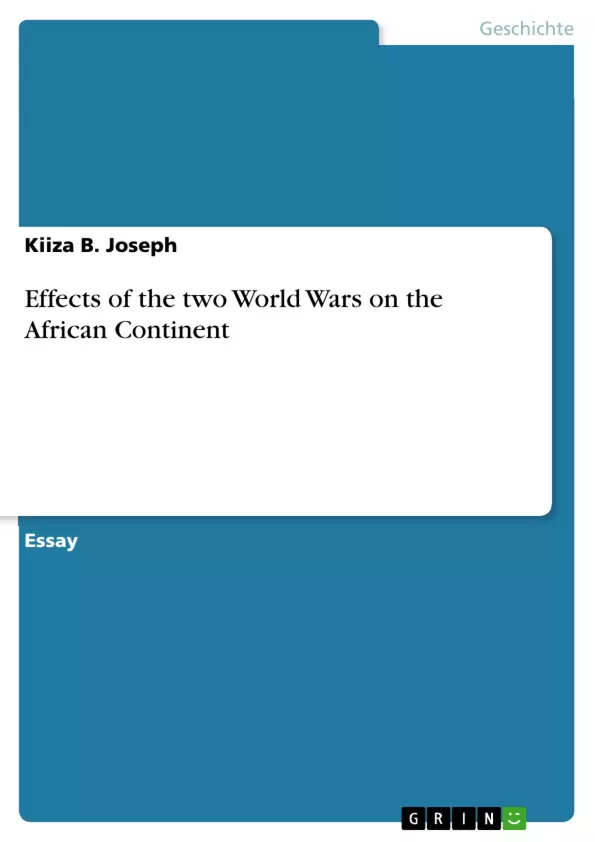This research will try to give an overview of the root causes of the world war I and world war II, but mainly it will try to discuss the effects of both wars on the African continent.
Inhaltsverzeichnis
- I. Einleitung
- II. Teil I: Erster Weltkrieg (1914-1918)
- II.A. Ursachen des Ersten Weltkriegs
- II.B. Auswirkungen des Ersten Weltkriegs auf Afrika
- II.C. Wirtschaftliche Folgen des Ersten Weltkriegs in Afrika
- II.D. Soziale und politische Folgen
- III. Teil II: Zweiter Weltkrieg (1939-1945)
Zielsetzung und Themenschwerpunkte
Diese Arbeit untersucht die Auswirkungen der beiden Weltkriege auf den afrikanischen Kontinent. Sie beleuchtet die Beteiligung Afrikas an den Kriegen und analysiert die daraus resultierenden wirtschaftlichen, sozialen und politischen Folgen. Der Fokus liegt auf den langfristigen Konsequenzen für die afrikanischen Gesellschaften.
- Beteiligung Afrikas am Ersten und Zweiten Weltkrieg
- Wirtschaftliche Folgen der Weltkriege in Afrika (Handel, Ressourcen, Armut)
- Soziale Auswirkungen (Verlust von Menschenleben, Krankheiten, soziale Veränderungen)
- Politische Folgen (Nationalismus, Kolonialismus, Selbstbestimmung)
- Langzeitfolgen für die afrikanischen Gesellschaften
Zusammenfassung der Kapitel
Die Einleitung beschreibt den Kontext der Weltkriege in Afrika und ihre Bedeutung. Kapitel II.A analysiert die Ursachen des Ersten Weltkriegs, einschließlich wirtschaftlicher, imperialistischer und nationalistischer Faktoren. Kapitel II.B beschreibt die Beteiligung Afrikas am Ersten Weltkrieg und die daraus resultierenden Folgen. Kapitel II.C konzentriert sich auf die wirtschaftlichen Folgen des Krieges in Afrika, wie den Zusammenbruch des Handels und die Verschlechterung der Lebensbedingungen. Kapitel II.D befasst sich mit den sozialen und politischen Konsequenzen, inklusive des Anstiegs des Nationalismus und Veränderungen im Verhältnis zwischen Europa und Afrika. Kapitel III bietet eine kurze Einleitung zum Zweiten Weltkrieg und seiner globalen Bedeutung; eine detaillierte Analyse der Auswirkungen auf Afrika folgt nicht.
Schlüsselwörter
Erster Weltkrieg, Zweiter Weltkrieg, Afrika, Kolonialismus, Imperialismus, Nationalismus, Wirtschaftliche Folgen, Soziale Folgen, Politische Folgen, Selbstbestimmung, Handel, Armut, Kriegführung.
Häufig gestellte Fragen
Welche Auswirkungen hatten die Weltkriege auf den afrikanischen Kontinent?
Die Kriege führten zu massiven wirtschaftlichen Umbrüchen, sozialen Veränderungen und stärkten den afrikanischen Nationalismus sowie den Ruf nach Selbstbestimmung.
Welche wirtschaftlichen Folgen traten in Afrika nach dem Ersten Weltkrieg auf?
Es kam zu einem Zusammenbruch des Handels, Ressourcenknappheit und einer deutlichen Verschlechterung der Lebensbedingungen vieler Menschen.
Warum stieg der Nationalismus in Afrika nach den Weltkriegen an?
Die Beteiligung afrikanischer Soldaten und die Erfahrung der Kriege veränderten das Verhältnis zu den europäischen Kolonialmächten und weckten den Wunsch nach Unabhängigkeit.
Was waren die sozialen Folgen der Kriege für die afrikanische Bevölkerung?
Neben dem Verlust zahlreicher Menschenleben führten die Kriege zur Ausbreitung von Krankheiten und tiefgreifenden Veränderungen in den traditionellen gesellschaftlichen Strukturen.
Behandelt die Arbeit beide Weltkriege gleichermaßen?
Der Schwerpunkt der vorliegenden Analyse liegt auf dem Ersten Weltkrieg, während der Zweite Weltkrieg einführend als global bedeutendes Ereignis erwähnt wird.
- Quote paper
- Kiiza B. Joseph (Author), 2011, Effects of the two World Wars on the African Continent, Munich, GRIN Verlag, https://www.grin.com/document/183276



